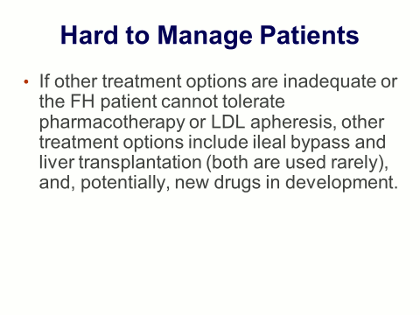Ito - Figure 14 - Hard-to-manage patients Text
Finally, what about hard-to-manage patients, patients who do not respond or patients who are intolerant to pharmacologic therapy or LDL apheresis? For FH patients such as these, ileal bypass surgery has been done, and there is a prospective, randomized trial, the Program on the Surgical Control of the Hyperlipidemias (POSCH),[27] that was conducted many years ago. In this trial 838 women with a previous history of myocardial infarction were randomized to diet or diet plus ileal bypass surgery and then followed for about 5 years. The result was a a 38% reduction in LDL cholesterol accompanied by a significant reduction in total mortality and CHD events, as well as regression of coronary lesions.
Another option is liver transplantation, which can replenish active or functional LDL receptors into FH patients. There are no prospective studies in FH patients receiving liver transplantation but several cases have been reported in the literature and these show reductions in LDL cholesterol of up to 60-80% as well as a normalization of LDL cholesterol levels following a liver transplantation. In addition, there was a reduction in xanthomas, as well as regression in coronary lesions, in some of these case reports. Of course liver transplantation has certain drawbacks, including the effects of long-term immunosuppression and the adverse events that occur with that.
J Clin Lipidol. 2011; 5(6).References
[27]Buchwald H, Varco RL, Matts JP, et al. Effect of partial ileal bypass surgery on mortality and morbidity from coronary heart disease in patients with hypercholesterolemia. Report of the Program on the Surgical Control of the Hyperlipidemias (POSCH). N Engl J Med. 1990 Oct 4;323(14):946-55.
